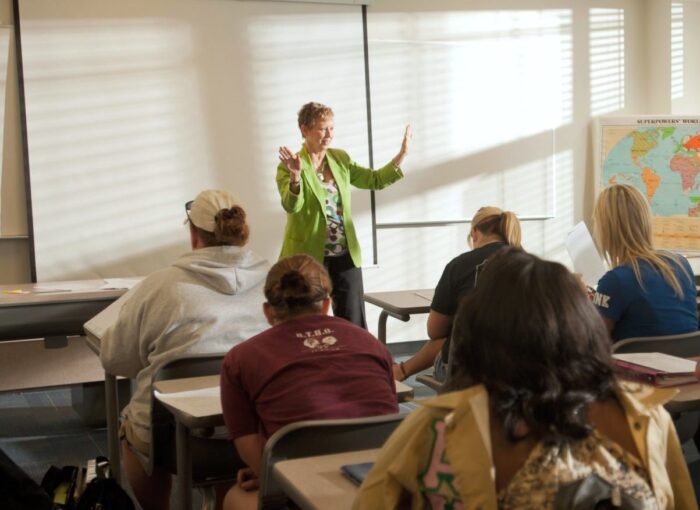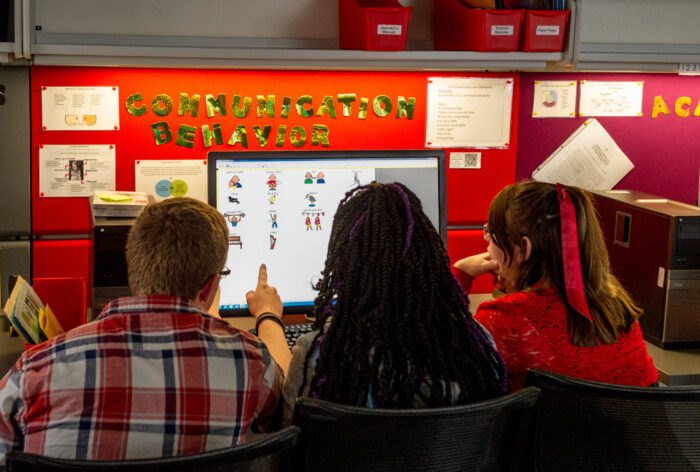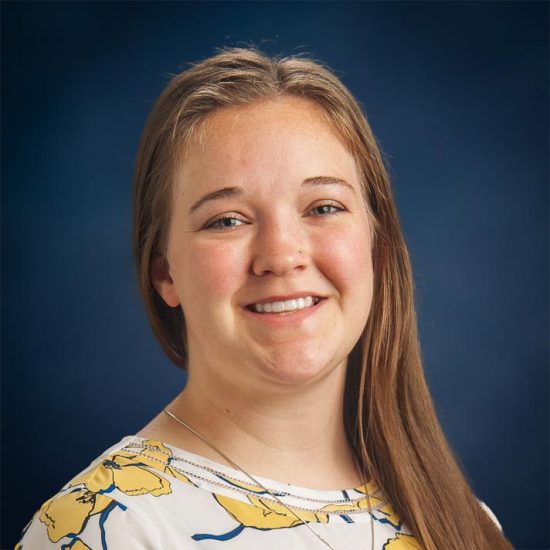
Special Education (MED)
with Educational Diagnostician Certification
You will learn to assess students, analyze the data and develop a plan to help each student get the support they need for success.
Students Need Advocates
Is your goal to advocate for students who struggle academically? Our master’s degree in Special Education with Educational Diagnostician certification will prepare you to assess students’ academic needs and prepare a detailed report and strategies to help them reach their learning potential. Our program cultivates your knack for analyzing data to become a stronger advocate for students struggling academically. Take the next step to earning your master’s degree and becoming an educational diagnostician.

Careers
Gain the recognition you deserve by earning your master’s degree in special education. Graduate with confidence, knowing our program boasts a nearly 100% employment rate throughout Texas.
Career Possibilities and Current Median Salaries
US DOL Bureau of Labor Statistics, Occupational Outlook Handbook, 2019. TEA Staff FTE Counts and Salary Reports, 2020. Indeed.com, 2021.
SEE YOURSELF SUCCEED WITH A DEGREE IN Special education
what you will learn
A master’s degree in special education offers the opportunity to:
- Understand techniques to promote achievement in language, reading and math
- Gain knowledge of diagnostic characteristics and their effects on learning
- Learn to provide instruction while accommodating students’ needs
- Earn specific training in diagnosis and intervention strategies for exceptional learners
- Conduct behavioral assessments, promote behavioral management and develop intervention when needed

Focus Your Passion
Our department offers two tracks designed to meet your research interests and career goals. Both tracks are offered as a Master of Science (MS) degree.
Thesis Track
Pique your interest in special education diagnostic work. Earn your master's degree while researching a targeted topic as you prepare for your career as an educational diagnostician. Our 42-hour thesis track takes you deep into current research and the practical tools you will need as an educational diagnostician.
Non-Thesis Track
If you're ready for a career change and interested in being an educator but don't have a teaching certificate, we're here to help! Our 39-hour non-thesis track prepares you to design prevention and intervention strategies to help educators work with exceptional learners. It is composed of 36 semester hours of coursework and 3 semester hours in a practicum.
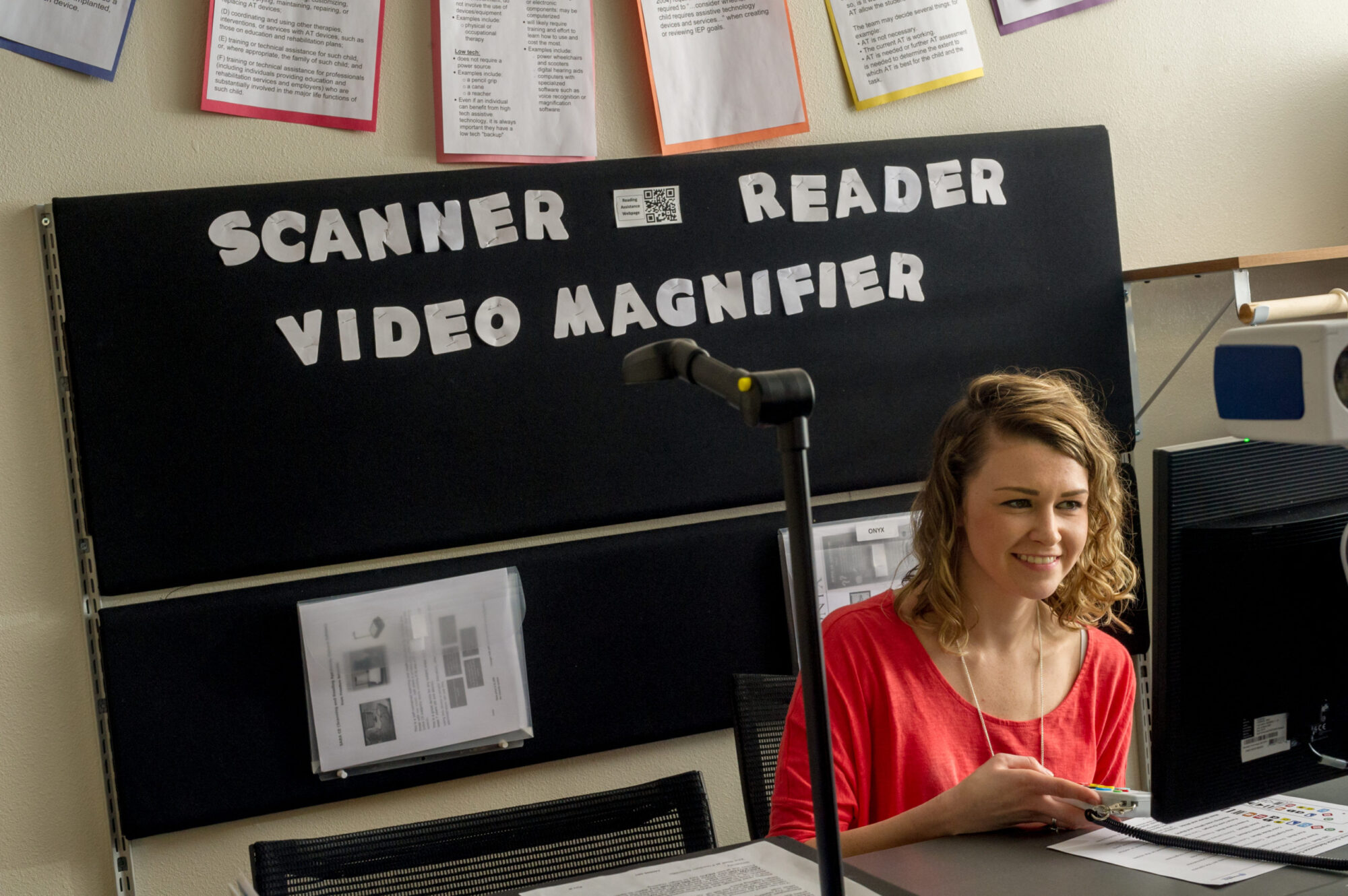
Assistive Technology Lab
As a collaboration among the Department of Psychology and Special Education, the Center for Information Technology Excellence, and Velma K. Waters Library, this unique facility features multiple examples of assistive technology specifically designed to empower individuals with disabilities and educate future teachers.
Faculty Spotlight

Michelle Hanks, M.Ed.
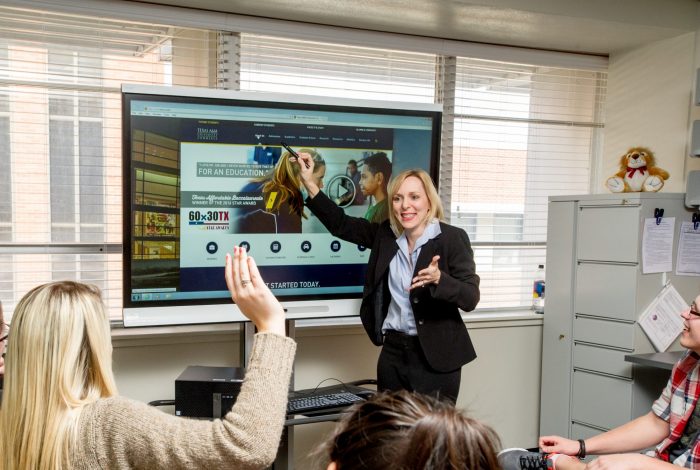
Beth Jones, Ph.D.

Kelly M. Carrero, Ph.D., BCBA, LBA-TX

Course Delivery
Our flexible Master of Science in Special Education with Educational Diagnostician certification program is designed for current educators and working professionals. The program requires two classes with face-to-face and Zoom-synchronous components. We also offer some face-to-face courses at the Mesquite Metroplex Center. Most other courses are offered asynchronously online.
Please check the schedule of classes for locations and times. Locations and times are subject to change.
Degree Plans
PROGRAM COSTS
Tuition and fees for graduate students taking nine credit hours are $3,669 for Texas residents and $7,341 for non-residents.
Admission
Your Path to Becoming a Lion
Note: This program is not currently available to international students. If you are an H1B or H4 applicant, please contact the Graduate School for details.
- Select “Create a new graduate school admissions application.”
- Select “Texas A&M University-Commerce (Commerce)” as your “Target University.”
- Select “Special Education, MS or Special Education, MED” as your “Major.”
Domestic Application Fee 395064
- Pay the $50 application fee.
Wait to receive an application confirmation email before proceeding to the next step.
- After you submit your application, the Graduate School will send a confirmation email within two business days to the personal email account you used for ApplyTexas.
Wait to receive an application confirmation email before proceeding to the next step.
- After you submit your application, the Graduate School will send a confirmation email within two business days to the personal email account you used for ApplyTexas.
Submit the following documents after you receive an application confirmation email.
- Upload your documents at myLeo > Apps > Check Admissions Application Status & Test Scores or email your documents to your graduate coordinator unless otherwise specified below.
Graduate Coordinator DeRene Sutton 395159
Your Graduate Coordinator
Contact your previous institution(s) and request that they send your official transcripts to your graduate coordinator.
- We recommend that you request transcripts for all of your academic work.
All international transcripts must be evaluated and the evaluation submitted to the Graduate School.
We accept evaluations sent directly from the following Agencies.
- If a normal evaluation is submitted, official original transcripts with all marksheets will still need to be submitted.
- If a WES ICAP or equivalent is submitted, we will not need the official transcripts to be submitted separately.
If your institution is unable to submit a digital copy, hard copies may be mailed to:
Texas A&M University-Commerce
Attn: Graduate School
PO Box 3011
Commerce, Texas 75429-3011
We will need official/original documents. If those documents are the only copies you have, the Graduate School can mail them back to you upon request. Contact your graduate coordinator for more information.
Request three signed letters of recommendation, on letterhead, from professionals who can attest to your goals and ability to succeed in the program.
- At least one of the references should hold a doctoral degree.
Those individuals should
- Email the letter to your graduate coordinator or
- Send the letter to you. Then, you will utilize the upload system: myLeo > Apps > Check Admissions Application Status & Test Scores
Submit a statement of educational and professional goals of 500 words or less on the following prompt:
- Discuss your educational and professional goals and how you believe this graduate degree will help you achieve them.
Submit a resume or curriculum vitae (CV) which includes your academic and professional history and achievements.
You do not need to submit GRE scores if you have:
- a completed bachelor’s degree from a regionally accredited university with a 3.25 GPA overall or higher
- a completed master’s degree from a regionally accredited university with a 3.25 GPA overall or higher
If you do not meet the GPA exemption criteria, request that your GRE® scores be sent to Texas A&M University-Commerce (6188) when you register for the test. If you have already taken the GRE®, you can order additional score reports.
Look for application updates in myLeo > Apps > Check Application Status
- Once an admission decision has been made, you will receive an email to your student email account at myLeo > Apps > Leomail.
Once your application to the Graduate School is complete, you can submit your Educational Diagnostician Certification Program Application right away using TK20. If you have any questions, please email [email protected].
- Go to the Educator Certification page on MarketPlace
- Click Educator Professional Fee
- Click the shopping cart plus icon
- Fill in your personal information to be associated with the fee and click “Continue”
- Go back to the Educator Certification page on MarketPlace
- Click TEA Assessment Fee
- Click the shopping cart plus icon
- Complete your payment
- Download and save your receipts to upload to TK20
You will need to have the following documents ready for upload in order to submit the application:
- Certification fee receipt
- TEA Assessment fee receipt
- Teaching service record
- A minimum of zero years of experience is required for admission to the master's degree-seeking path for educational diagnostician. If you do not have a completed year of service yet, please submit a letter of explanation in TK20 in place of your service record. The application will not submit if this required attachment is missing.
- Standard Texas Teaching Certificate
- Note: Candidates on emergency permits, intern or probationary certificates will not be admitted.
- Official transcripts from the Graduate Office will be reviewed by the certification office.
- Official transcripts from all institutions must be submitted to the Graduate School in order to satisfy TEA certification admission requirements.
- A minimum GPA of 3.0 on a conferred master's degree or a minimum GPA of 2.75 on a conferred bachelor's degree is required for certification admission. Please note that certification admission requirements may differ from those of the Graduate School and are separate requirements.
If applicable:
- TEA Transfers
- If you have previously been admitted to another educator preparation program for educational diagnostician certification.
- Request that a completed TEA transfer form be sent from your previous program to [email protected].
- Transcripts from outside the United States
- Contact [email protected] for any questions about TEA requirements for transcripts from outside the United States.
- If your official transcripts are from institutions outside the United States and the country of origin is not exempt by TEA, send the following documentation to [email protected]:
- A course-by-course evaluation from a TEA-approved Foreign Credential Evaluation Service
- Minimum scores on the Test of English as a Foreign Language (TOEFL iBT). Please note that TOEFL scores are only valid for a period of two years. Required minimum scores are 24 for Speaking, 22 for Listening, 22 for Reading and 21 for Writing.
- As of 3/4/2022, a valid standard Texas educator certificate will be accepted in lieu of TOEFL iBT scores.
- Go to tamuc.tk20.com
- Scroll down and click “Admissions”
- Select “Click here to create your account.”
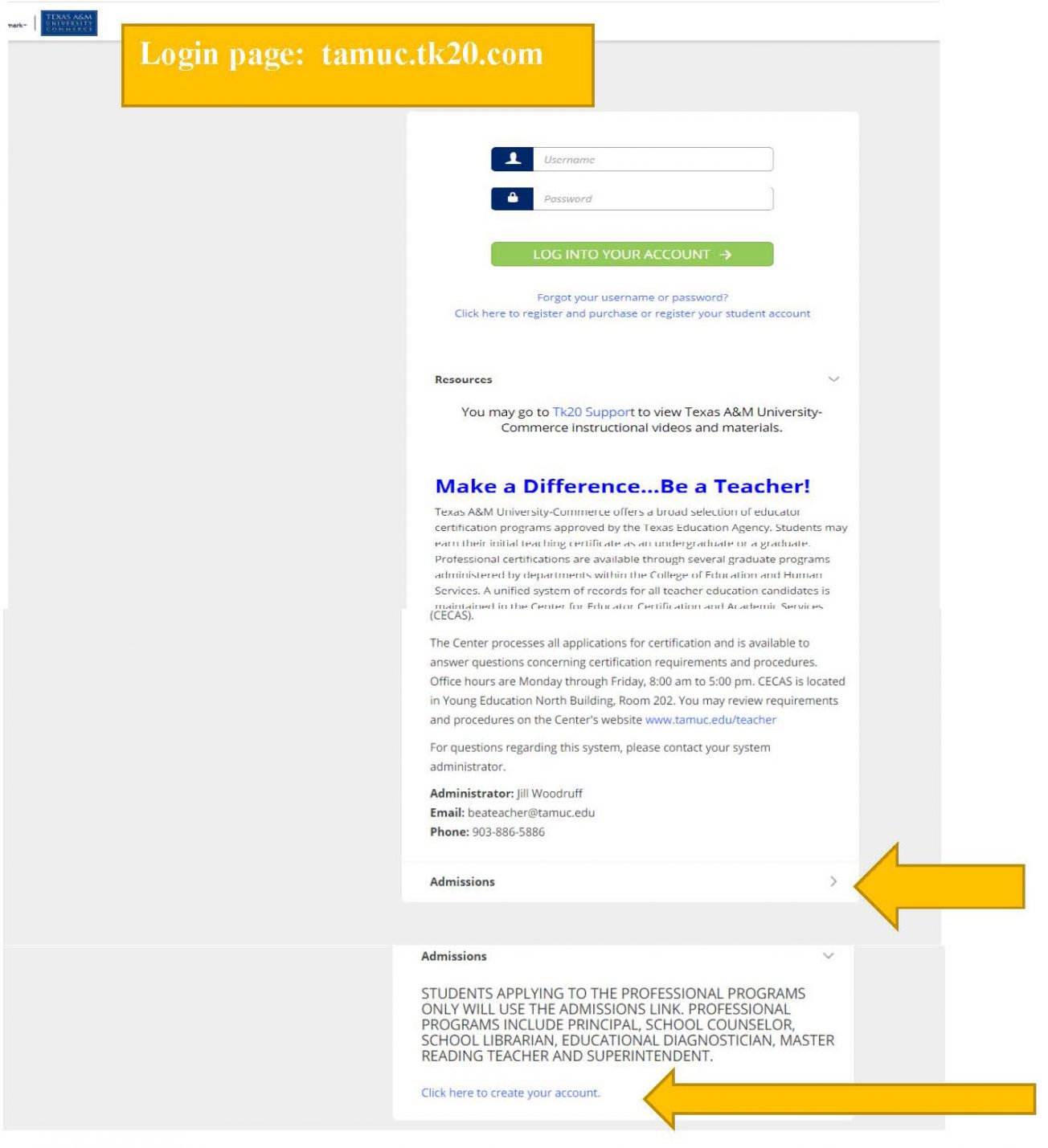
- Complete the “Create Applicant Account” form.
- Note: You will be creating a password for this account.
- Store the password you create in a secure location so you can refer to it later.
- After completing the “Create Applicant Account” form, TK20 will provide your username.
- Store your TK20 username and password in a secure location so you can refer to them later.
- You will use the username to log in to review your admission application once submitted.
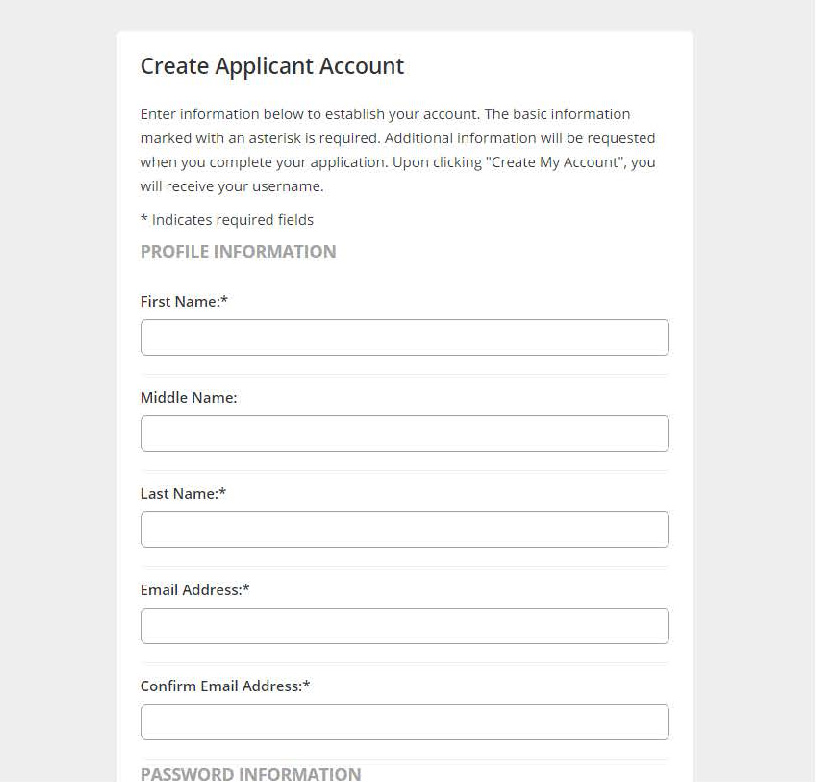
- Log into your TK20 account
- Click on the “back to login” link.
- Enter your username and password.
- Click the green “Log Into Your Account” button.
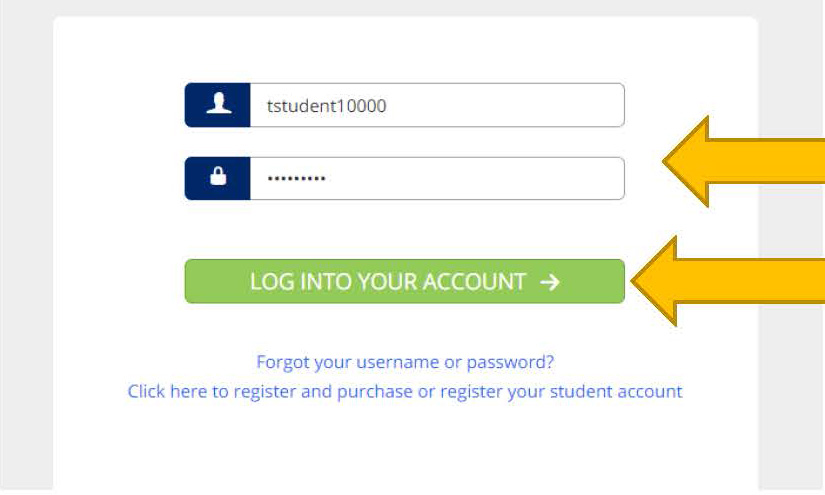
- Click on the “Create New Application” button.
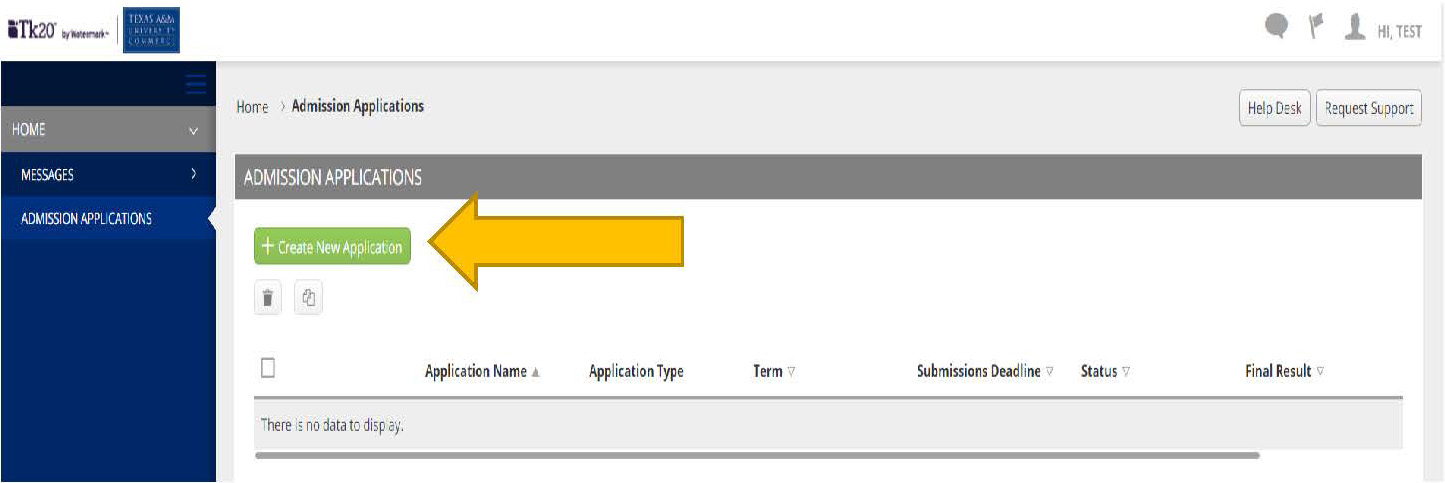
- Select “Educational Diagnostician” application
- Click the “Next” button.

- Complete the application.
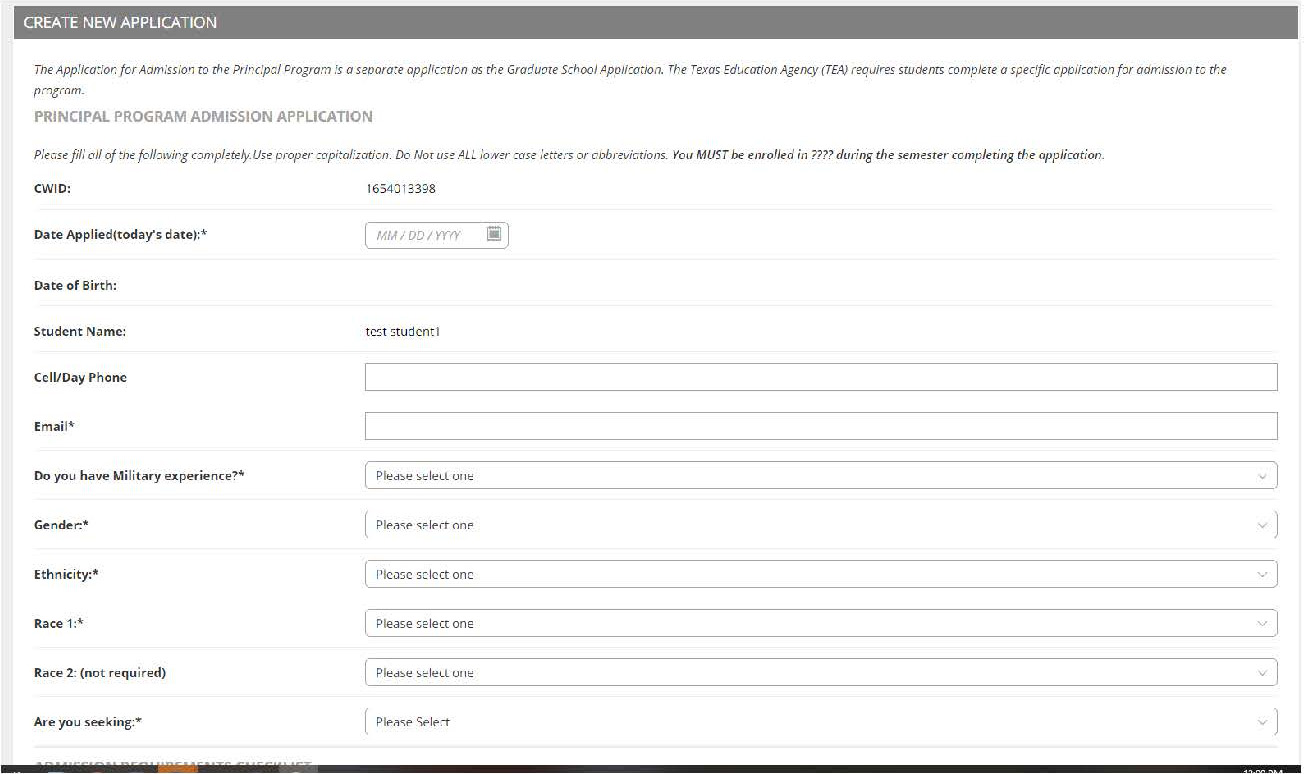
- Upload documents by clicking on the “+ Select File(s)” button for the item you are uploading.
- Once you have completed all fields in the application, click the “Submit” button.
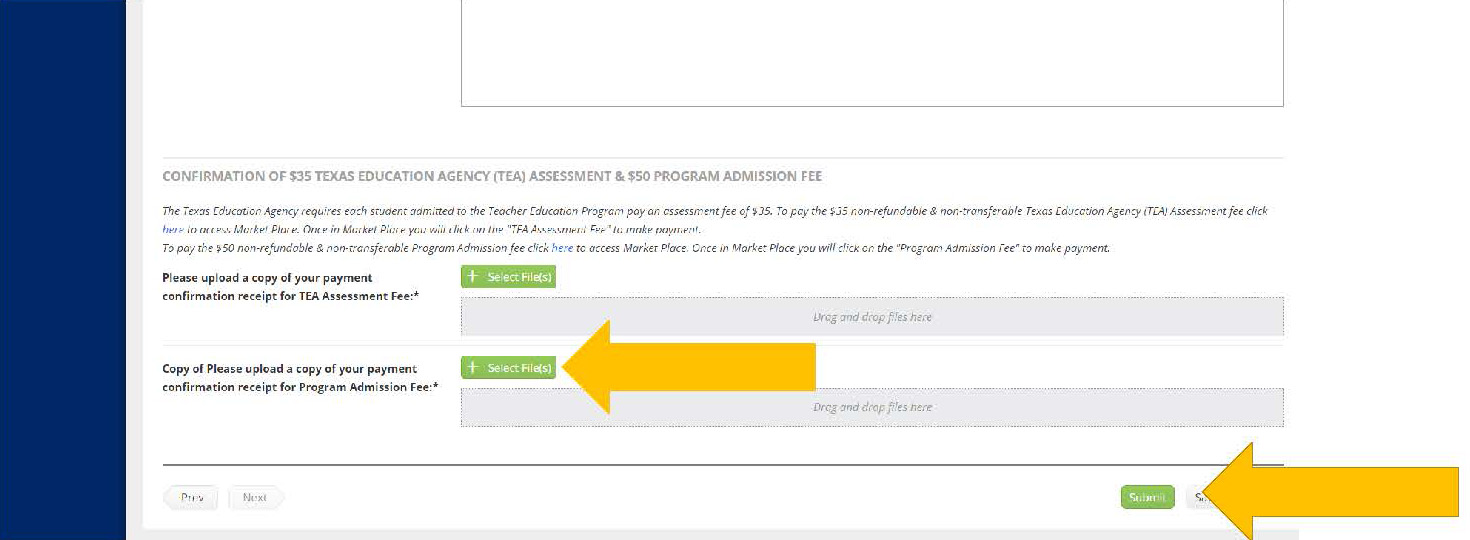
- Look for an email from TK20 confirming your submission.

To check your application status:
- Log in to your TK20 Student Admissions account
- On the “Home” tab, locate your application under “Recent Messages”
- Click on the application.
- If you are admitted, the message will indicate your application was “Admitted”
- If you lack admission requirements, the message will indicate “Denied.”
- Click on “Review Document” to view your deficiencies and reason(s) for denial.
Once both the Graduate School and Certification Program Applications are complete, the Educational Diagnostician Program Director will reach out to schedule an interview. Interview days are typically scheduled on a monthly basis.
Once accepted, please sign and return the “letter of invitation.”
- Apply for scholarships and graduate assistantships once you are admitted.
- Apply for financial aid by submitting a FAFSA and sending it to school code 003565.
- Contact your financial aid advisor with any questions.
Once registration opens and you are eligible to enroll, your graduate enrollment specialist is here to help you complete registration.
- View your degree plan in DegreeWorks.
- View the Schedule of Classes.
- To register for classes, go to myLeo > Student Resources > Registration Menu.
Contact your graduate enrollment specialist if you have any questions regarding your degree plan and registration.
Graduate Enrollment Specialist Audrey Weiss 395278
Your Graduate Enrollment Specialist
Featured Courses
We are here to help!
Frequently Asked Questions
Are there prerequisites I need to be sure to complete?
Can I get my certification to be an educational diagnostician without completing a master's degree?
If you hold a Master’s Degree and have completed three years of teaching, you may decide to go Educational Diagnostician-Certification Only. This plan is 6 classes plus a practicum (21 hours), and you do not take the Comprehensive Exam or complete a thesis. If this is what you choose, you will apply through the Educational Diagnostician Certification program.
What does practicum for the educational diagnostician candidates entail?
Practicum must be done in a school setting. The TEA requirement is 160 hours with 1/3 of those being direct service hours. Practicum is typically completed in your last semester (fall or spring) and you take your TExES 153 during your practicum semester. Most students complete Practicum while working full-time.
When are application deadlines?
For either degree-seeking applicants or those for certification only, we have rolling admissions, which means you can apply anytime. We typically hold interviews once a month via Zoom. If you don’t get scheduled for the month you apply, you will be interviewed the following month.
What happens after we receive your completed application?
Once our department receives your complete file from the Graduate School, the faculty will review it and make a determination regarding whether to move forward to the interview process. If so, you will be contacted to schedule the interview.
How do I apply?
To apply to the program (degree-seeking; can apply without an existing mater’s or two years of teaching), you will need to apply formally through the Graduate School.
As part of the application packet, you will need to include:
- 3 letters of recommendation (current and preferably from professionals, not friends; signed and on letterhead)
- a writing sample giving your goals statement (why you are applying to our program and your future goals)
- all college transcripts
- GRE examination results (the printout provided by the testing company) ONLY if your undergraduate GPA is less than a 3.25
- a copy of your teaching certificate (educational diagnostician applicants only)
- any language equivalency test results
- Attend face to face interview, if invited
When our Department receives communication from the Graduate School that your complete application has been received, your file will be dispersed to the special education faculty. They will then independently review your file and submit a vote on whether to move to the interview process. If an interview is recommended, I will be in contact with you to set it up.
What is the course sequence in Special Education graduate program? What about in Educational Diagnostician certification program only?
Download the Course Sequence for details.
What are the degree options in Special Education?
- Master of Special Education (36 hours)
- Master of Special Education (Educational Diagnostician) (39 hours for non-thesis/42 hours thesis;
- Candidates that already hold a master’s can apply for Educational Diagnostician certification only—18 hours plus a practicum)
- Post-baccalaureate with initial certification (36 hours)
- A minor in Special Education (12 hours).
All degree plans have a thesis or non-thesis option (thesis does not apply to certification only).
Class offerings are primarily online. However, that the assessment courses (SPED 573 and 574) on the educational diagnostician track will remain face-to-face, but they will be offered in a block in the summer to accommodate teachers.
Find more information on available degree plans and required coursework on the catalog.
Related Degree Programs
Contact Us
- Psychology and Special Education
- 903.886.5631
- [email protected]



 Careers
Careers
